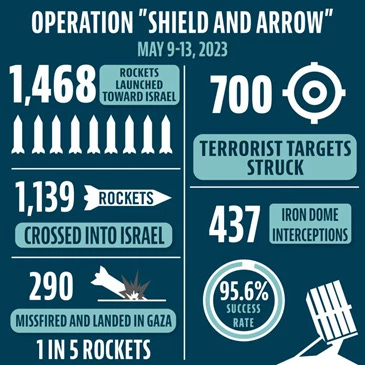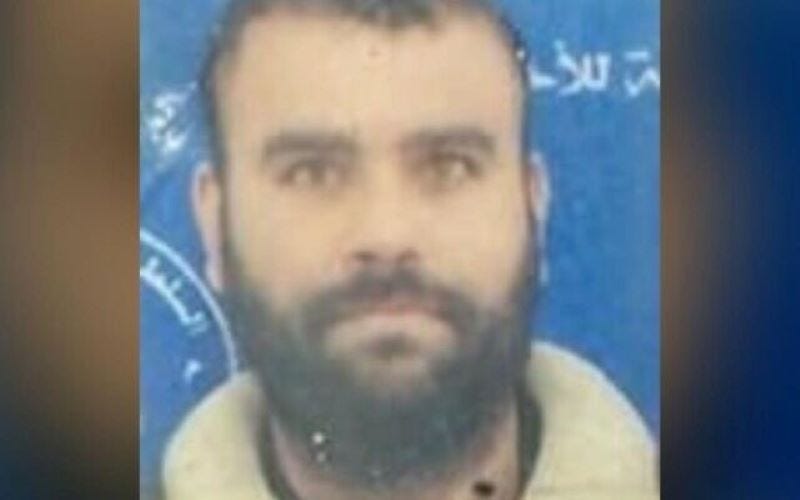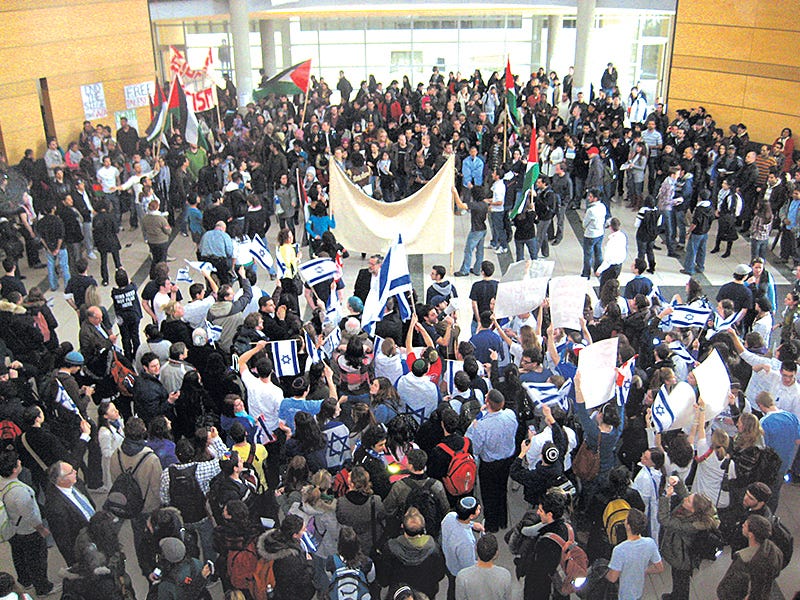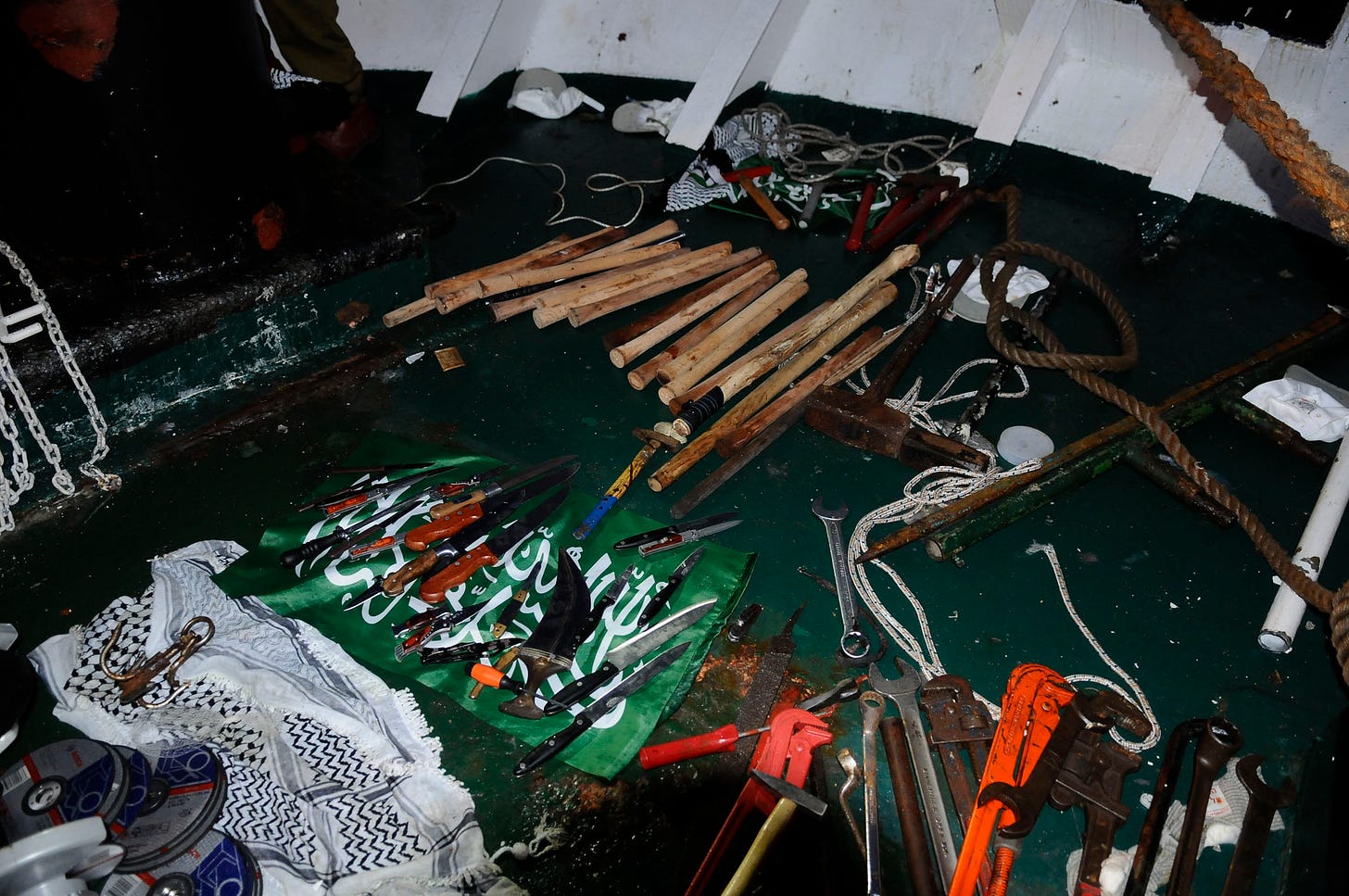It’s not my fault
When I was a student at York University, I was told that it would be inappropriate for me to organize and host a Holocaust Remembrance Day event on campus because I was responsible for perpetrating a genocide against the Palestinian people.
Several days later I was also personally blamed for perpetrating the Sabra and Shatila massacres in Lebanon in 1982. A nifty allegation of both time travel and militant ambitions rolled into one.
Of course, I was born three years after the terrible massacres, and in my pre-natal state I was neither interested nor active in regional or international military operations. Further, using the term “genocide” to refer to the Palestinian situation is such an utterly ludicrous assertion that the speaker’s ignorance immediately speaks for itself.
Welcome to the Israel-Palestine conflict, a debate mired in willful ignorance and nonsense.
In the last weeks on that front, we have seen incessant rocket barrages launched at Israeli civilian centres, and “Nakba Day” demonstrations in Toronto and elsewhere.
Rockets
On May 8, Israel launched “Operation Shield and Arrow”, targeting three senior members of the Palestinian Islamic Jihad (PIJ) terror group in Gaza. A retaliatory strike against the PIJ for rocket fire originating from Gaza the week prior, Israel eliminated these leaders to avenge the attacks perpetrated and prevent further terror attacks in the works. The PIJ responded to Israel’s response with indiscriminate rocket fire into Israel.
Over five days, 1,469 rockets were launched at Israel. Though there was property damage, Iron Dome intercepted a vast majority of the rockets that would have otherwise landed in Israel (95.6% of rockets targeted by Iron Dome were destroyed).
Tragically, one Israeli died in Rehovot, and a Palestinian worker from Gaza named Abdullah Abu Jaba was killed when a rocket struck a field near Shokeda, in Israel. This received no coverage in the media whatsoever. He was murdered by Arabs and not by Jews. It is not newsworthy to report on the Palestinians unless the Jews are the perpetrator.
In fact, 291 of the rockets launched landed within Gaza, with Palestinian terror groups endangering the lives of other Palestinians.
“Some Palestinians just aren’t Palestinian enough for pro-Palestinians.”
Stephen Daisley, writing in The Spectator, recently wrote an excellent piece entitled “The Inconvenient Palestinians.” In it, he spoke about Abu Jaba, referenced above. He noted how Abu Jaba was one of 18,000 Gazans who works in Israel on a daily basis, and how he was killed when a rocket hit the field in Israel where he was working with his brother Hamad.
Other Palestinians were killed at the hands of the PIJ that week, including Ahmed Muhammad a-Shabaki (51), Rami Shadi Hamdan (16), Yazan Jawdat Fathi Elayyan (16), and Layan Bilal Mohammad Abdullah Mdoukh (10), who are all believed to have died when rockets fell short and landed within Gaza. But you will not hear about them, and squares in Gaza will not fly flags emblazoned with their faces. Their deaths did not serve a grusome political purpose. In fact, when you Google their names, the top four results are from pro-Israel websites showing that the deaths were self-inflicted by the Palestinians, with several other sites wrongfully attributing their deaths to Israel.
Daisley writes:
Palestinians are killed in Israeli air strikes, too. These Palestinians are also parents and children, and while there is no moral equivalence between lawful self-defence and terrorism, death is death. The difference is that Palestinians inadvertently killed by Israel quickly become faces of the conflict while you have to turn to page 27 and scan another dozen paragraphs to learn about Palestinians killed by Palestinian terrorism. The practitioners of this double standard want the world to see the Palestinians but they themselves can see only symbols, and Palestinians who lack symbolic value are of lesser interest to them. Some Palestinians just aren’t Palestinian enough for pro-Palestinians.
Western progressives aren’t alone in seeing Palestinians as symbols. To their political and paramilitary leaders, the Palestinians are archetypes, emblems of resistance and emblems of victimhood, their deaths peddled as martyrdom for the domestic audience and ethnic oppression for gullible CNN producers. Palestinians who fit into neither category lack instrumental value and may even prompt unhelpful questions about a leadership which has consistently failed its people.
…[Abu Jaba] needed to be someone else’s story and his death to bear a meaning it could not support. Because it couldn’t, Abu Jaba will quickly be forgotten like all the others who could not be made into symbols. He was an inconvenient Palestinian.
“Some Palestinians just aren’t Palestinian enough for pro-Palestinians.” We used to say something like this often when we talked about the difference of the campus conflict versus the conflict in the Middle East: Jews on campus were more Israeli than the Israelis, and Arabs were more Palestinian than the Palestinians. It was the wisdom of extreme campus politics. Henry Kissinger quipped that, “The reason that university politics is so vicious is because the stakes are so small.”
Pro-Palestinian v. Anti-Israel
I would offer however that the conflict Daisley describes is not a conflict between the pro-Israel and pro-Palestinian camps, but rather pro-Israel versus anti-Israel. There is no room for the pro-Palestinian crowd in the conflict anymore (in fact, I’d consider myself fairly pro-Palestinian in that I think they should have their own state, I think peace would make their lives better, and that they should not be put in harm’s way by anyone, including their own leaders). The anti-Israel crowd has usurped their position, and they only care about hurting Israel, not so much about the Palestinians. I’d wager that most pro-Israel activists are also pro-Palestinian, but that distorts the narrative the other side has tried to paint about the dichotomy of the two camps.
One day in February 2005, I was discreetly observing an anti-Israel rally at York University, when in amongst the chanting and shouting about “genocidal Zionism”, a young woman sporting a keffiyah spoke up. She announced that Mahmoud Abbas and Ariel Sharon had just met at Taba, and agreed to end the fighting that was the 2nd Intifada. Noting how the end of violence would help save Palestinian lives, and expressing an optimism about the peace process, she appeared hopeful. Is peace a positive development for the Palestinians? Of course. Is it pro-Palestinian to be pro-peace? Absolutely. Should peaceful overtures in the region be welcomed? Certainly! So this woman was naturally hoisted up on the shoulders of her friends in the crowd, and they cheered the fact that peace was imminent. “Shalom Salaam Peace!!!”
Obviously, I am joking, because this woman who praised the end of violence was booed right out of the room.
There was no place for talking about peace at the rally. Those in attendance wanted to “Globalize the Intifada”, insisting that, “from the river to the sea, Palestine will be free!”
To the anti-Israel crowd on campus, the Israel-Palestinian conflict was/is a zero sum game: there could only be a benefit for the Palestinians at Israel’s expense. That expense would be the death of an Israeli, a rocket in a living room, an international embarassment in the media, or a protestor at the UN. Only help Palestinians when Israelis can be hurt.
Take for example the Mavi Marmara incident in May 2010. A “humanitarian convoy” set sail for Gaza, which was then, as now, under naval blockade by Israel. The scene was set for a conflict with the Israeli navy. There was not, however, any humanitarian material on board. There were however a lot of weapons, and people on board willing to use them. Those leading the convoy knew they would be confronted by the Israeli navy, and set sail nonetheless. They knew their cargo would not help the Palestinians, only further the conflict, and set sail nonetheless. The whole stunt was intended to show Israeli soldiers intercepting a humanitarian flotilla with guns drawn. It was designed to embarrass the Israelis, while doing nothing to help the Palestinians.
Question: Where is the humanitarian convoy actually containing humanitarian goods? Where are the pro-Palestinian activists organizing to get Palestinians the food stuffs and building materials that they could likely very well put to use in Gaza, as opposed to just trying to stoke the flames of the conflict? We don’t see it, because such action would not be bad for Israel, and so it cannot be good for the Palestinians.
The Palestinians deserve better. They have always deserved better. Have they been wronged at the hands of the Israelis? Yes. Is it a genocide? Give me a break. Have they been wronged at the hands of their own leaders? Most definitely. Have they been mistreated by their Arab neighbours? For at least eight decades. Have their lives, their futures, and their best interests been misappropriated by anti-Israel activists abroad? 100%. They deserve better, but people just can’t stop blaming the Jews.
Rallies
In Toronto this week, an anti-Israel crowd gathered at Younge/Dundas Square on Nakba Day. Nakba Day is a profoundly anti-Israel/Zionist/semitic event wherein supporters mark the “catastrophe” that was the establishment of a Jewish State in the Middle East.
At the rally in Toronto, one of the organizers yelled,
“Glory to our united armed resistance! Armed resistance from the river to the sea, including the resistance from the surrounding regions and its allies. Glory to the resistance. The Palestinian resistance is our glory. The Palestinian resistance is a legitimate representative, and only representative of Palestine and Palestinians.”
From the crowd, the chant of “Long Live the Intifada” could be heard, with the verse, “Resistance is justified when people are occupied, There is only one solution. Intifada, revolution Intifada, Intifada, long live the Intifada.”
Yep, they want Israel destroyed and dead Jews floating in the Mediterranean. But a prosperous Palestine need not be mutually exclusive from a not-destroyed Israel. It is far more likely that a Palestinian State would prosper with a vibrant Israel next door, at peace. But the foundation is laid: the world can only support the Palestinians at the expense of the Israelis. Otherwise, there is no point in helping them.
In fact, Nakba Day is the perfect example of my point above. On Nakba Day, anti-Israel activists roll out the fact that there remain Palestinian refugees, and all the same grievances from time immemorial. They can only try to make their case about Israel being evil if they have impoverished Palestinians on the ground. However, there is no reason why May 15 could not have been celebrated as a Palestinian independence day, a day when the Palestinians embraced what was offered to them by the UN 75 years ago. They just can’t do it though, as their narrative now must rely on Jewish evils to be sustained around the world.
Of course there are some organizations on the ground working hard to improve the lives of the Palestinians. But those organizations will not receive the spotlight they deserve unless they too drink from the anti-Israel chalice, at which point, they will no longer deserve any recognition at all.
Everyone deserves better
Palestinians, like Abdullah Abu Jaba, deserve better. In life, they deserve to be treated better by their leaders, not simply as pawns in a geopolitical game of chess. They ought not be kept in refugee camps for 75 years so that their leaders can pronounce “Look! We are still dispossessed!” They deserve to be accepted in the neighbouring Arab countries, not treated like a foreigner who will one day be returned to their long-gone grandfather’s home in Jaffa or Haifa. They won’t. Israel isn’t going anywhere. They deserve to have their best interests considered in their own right, and not just as part of a formula for how to hurt Israel. In death, innocent Palestinians deserve to be mourned, whether tragically killed by the Israelis or Palestinians.
Palestinian lives will only improve when anti-Israel activists actually become pro-Palestinian advocates, and shift their sights from Israel’s destruction towards Palestine’s construction. These goals are not mutually exclusive, and a peaceful coexistence, whatever it looks like, is good for everyone.
Willfully ignorant are those who think otherwise.








